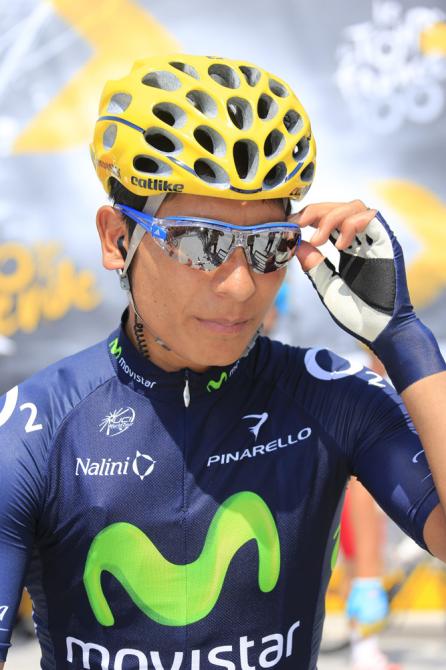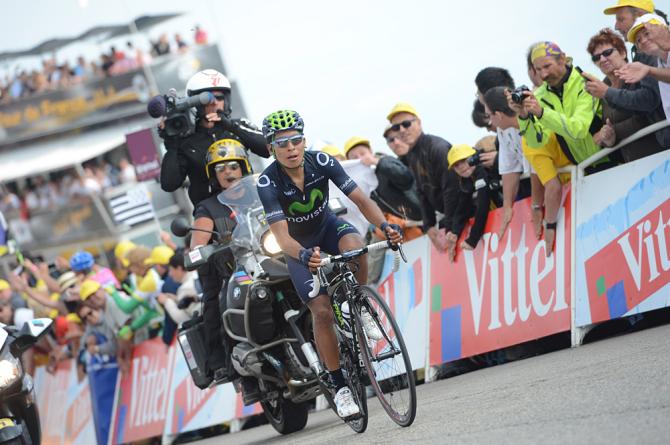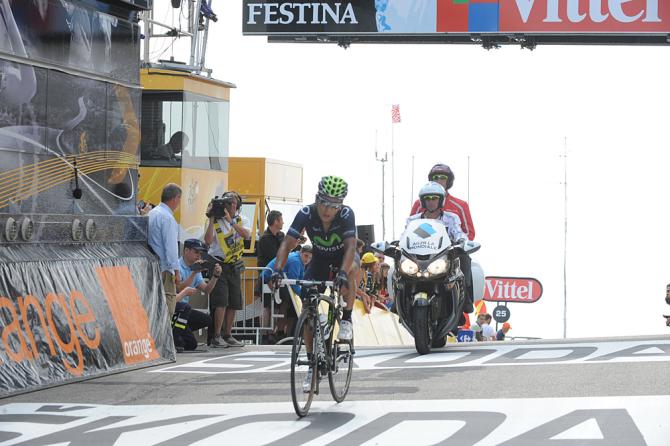Quintana last man standing in face of Froome's Ventoux attack
Colombian wants Tour de France podium place in Paris



Nairo Quintana (Movistar) was the last man standing on Mont Ventoux on stage 15 of the Tour de France, but although he largely succeeded in taming the worst excesses of the Giant of Provence, he was ultimately unable to hold the wheel of yellow jersey Chris Froome (Sky) in the final two kilometres.
The Colombian attacked with over 14 kilometres of climbing still to go and fiercely resisted Froome's forcing when he made the junction near Chalet Reynard, six kilometres from the summit.
Quintana finally had to yield when Froome kicked again near the Tom Simpson memorial, but although he reached the summit 29 seconds down in second place, he was still almost a minute clear of the first of the chasers who had been left scattered across the mountainside by the race leader's searing attack.
"I had the impression that I was going to win the stage, but in the end I didn't have the strength," Quintana said afterwards. "I gave it everything I had, but this was a difficult climb and we had raced at a fast pace all day even before we ever got to Mont Ventoux."
In spite of that high speed through the opening 220 kilometres of racing, and in spite of the intensity of Sky's forcing at the foot of the climb, Quintana showed few inhibitions once the road began to rear upwards.
Raphael Geminiani's famous 1955 warning to Ferdi Kubler, that "Mont Ventoux is no ordinary col: you can't tell it what to do," is one that generations of riders have diligently heeded ever since, but the young Quintana eschewed conventional wisdom when he danced clear of the yellow jersey group over 14 kilometres from the top, on the steep road through the forest.
Quickly settling into a comfortably seated style that brought back memories of illustrious forebears such as Luis Herrera, the impassive Quintana scarcely opened his mouth as he quickly opened up a lead of 40 seconds, catching and dropping earlier escapee Mikel Nieve (Euskaltel-Euskadi) in the process.
The latest race content, interviews, features, reviews and expert buying guides, direct to your inbox!
"I think I attacked too early," admitted Quintana, who had also ignored an early ill portent for an ascent that Roland Barthes likened to a God of Evil. "When I started the climb, I was bleeding from the nose."
Quintana's lead was slashed when Richie Porte took up the reins for Froome, and the yellow jersey motored across the gap alone shortly afterwards. When Quintana responded calmly to Froome's initial surge, however, it looked as if the Colombian was about to go the distance. Shortly afterwards, Froome leant across to discuss the terms of their collaboration.
"He told me to work with him because Contador was losing time. He said that if we were still together when we got to the finish then he would let me win, but I couldn't follow in the last two kilometres," Quintana said.
Quintana now moves up to 6th place on general classification and wrests possession of the white jersey back from Michal Kwiatkowski in the process. Making serious inroads into his 5:47 deficit to Froome seems a tall order but the 23-year-old was optimistic that he could ride his way onto the final overall podium in the Alps.
"I'm not worried about being team leader and I went from distance to try and gain time for the overall," Quintana said. "I don't want to have to choose between a podium place or the white jersey: I want them both."


Barry Ryan was Head of Features at Cyclingnews. He has covered professional cycling since 2010, reporting from the Tour de France, Giro d’Italia and events from Argentina to Japan. His writing has appeared in The Independent, Procycling and Cycling Plus. He is the author of The Ascent: Sean Kelly, Stephen Roche and the Rise of Irish Cycling’s Golden Generation, published by Gill Books.